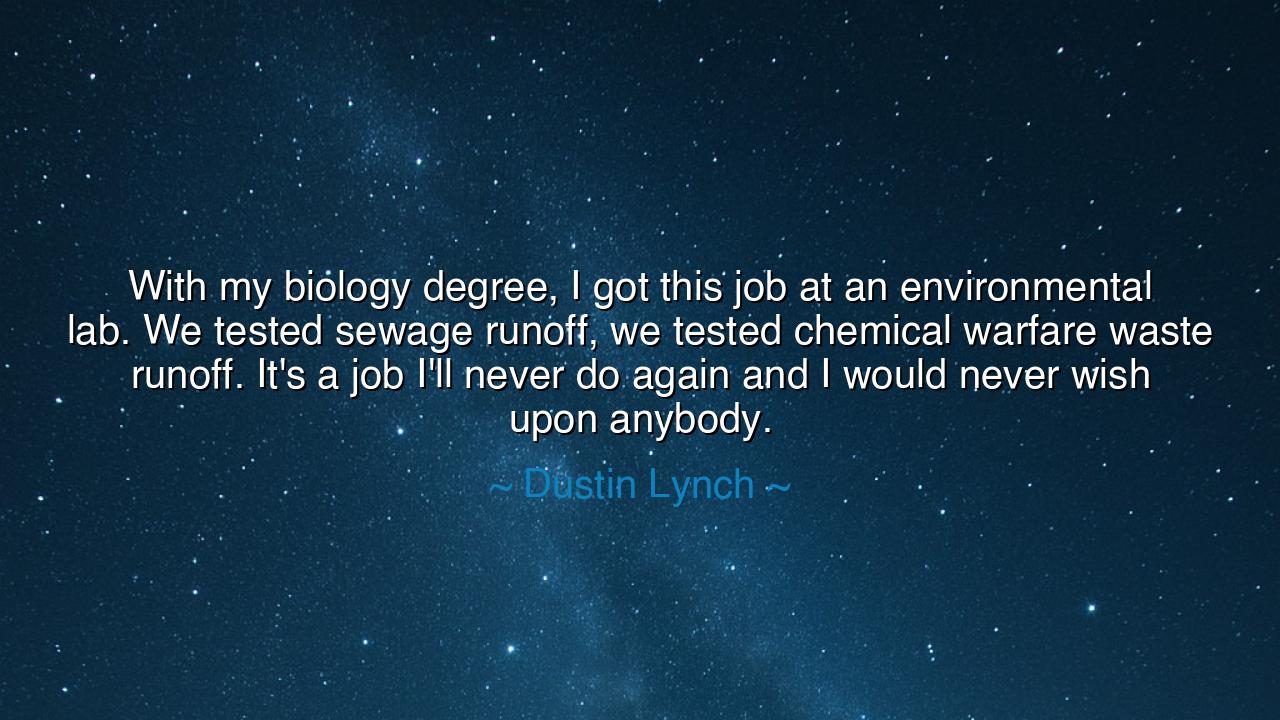
With my biology degree, I got this job at an environmental lab.
With my biology degree, I got this job at an environmental lab. We tested sewage runoff, we tested chemical warfare waste runoff. It's a job I'll never do again and I would never wish upon anybody.






Hear the raw confession of Dustin Lynch, who recalls the path he once walked: “With my biology degree, I got this job at an environmental lab. We tested sewage runoff, we tested chemical warfare waste runoff. It’s a job I’ll never do again and I would never wish upon anybody.” His words, though plain, ring with the weight of hardship and the bitterness of truth. For here is not a tale of glory, but of toil in shadows, where human hands meet the poisons of their own making.
The meaning of this saying lies first in the burden of unseen labor. Many live their lives unaware of the hidden workers who test the waters, measure the toxins, and confront the filth left behind by human industry. Lynch’s memory is a window into that world, where sewage runoff and chemical waste are not abstractions, but living dangers handled daily. The glamour of science gives way to the harshness of reality: that progress, unchecked, leaves behind decay, and someone must bear the task of measuring its cost.
The origin of such toil can be traced to the very rise of modern industry and war. The twentieth century left the earth scarred with pollutants, nuclear residues, and chemical warfare waste. In the aftermath of conflicts like World War II and the Vietnam War, countless scientists and workers were tasked with assessing the poisons unleashed upon land and water. Their work, often thankless and perilous, became the silent shield protecting others from unseen harm. Lynch’s tale is but one voice in this lineage of burdened guardians, who step into danger so others may live unknowing.
History offers a clear parallel in the story of the Chernobyl disaster of 1986. After the reactor exploded, sending invisible death into the skies, it was not generals nor kings who bore the weight, but the liquidators—hundreds of thousands of workers, firefighters, and scientists sent to clean the site, shovel radioactive debris, and measure contamination. Many suffered illness and early death. Their labor, grim and uncelebrated, saved millions more from greater harm. Like Lynch’s testimony, their story reminds us that humanity often entrusts its dirtiest burdens to those willing—or compelled—to face them.
Yet within Lynch’s lament lies also a deeper warning: that such work should not be endless, that societies must not continue creating poisons faster than they can be measured or contained. For if every generation must assign its sons and daughters to test toxic runoff and tend to industrial waste, then humanity is merely treading water in a sea of its own pollution. The higher calling is not only to endure such work, but to build a world where it is no longer necessary.
The lesson for us is this: do not take lightly the cost of waste, pollution, and war. Every choice we make—what we consume, what we discard, what we demand of industry—leaves behind a trail. Somewhere, someone must confront that trail, whether in a laboratory, a treatment plant, or a poisoned river. Let us lessen their burden by living with restraint, by choosing wisely, by supporting efforts to reduce the poisons we unleash upon the earth.
Therefore, take practical action: honor those who do the hidden work of safeguarding the environment. Support policies that prevent contamination rather than merely measuring it. Reduce your waste, question your convenience, and teach others the sacred link between what we do and what we leave behind. For as Lynch’s words remind us, the dirtiest jobs are borne by someone—and if we do not change, those burdens will multiply, passing from hand to hand like a curse.
So remember his testimony: “It’s a job I’ll never do again and I would never wish upon anybody.” Let it not only stir pity, but awaken resolve. May his words move us to create a future where no one must spend their days testing poisons born of human neglect, but instead use their science and labor to cultivate life, renewal, and the flourishing of the earth.






AAdministratorAdministrator
Welcome, honored guests. Please leave a comment, we will respond soon